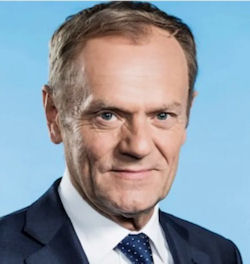Donald Tusk
 Donald Tusk was born on April 22, 1957 in Gdansk. His father worked as a railroad carpenter and his mother as a secretary in a hospital. Father died when Donald Tusk was 14 years old. In 1976, he began studying history at the University of Gdansk , where he became involved in illegal activities against the communist regime. He undertook, among others cooperation with the underground Free Trade Unions, he also met Lech Walesa, the future leader of Solidarity.
Donald Tusk was born on April 22, 1957 in Gdansk. His father worked as a railroad carpenter and his mother as a secretary in a hospital. Father died when Donald Tusk was 14 years old. In 1976, he began studying history at the University of Gdansk , where he became involved in illegal activities against the communist regime. He undertook, among others cooperation with the underground Free Trade Unions, he also met Lech Walesa, the future leader of Solidarity.
In 1980, he initiated the Independent Student Association (NZS), which became part of the Solidarity movement. He became the chairman of Solidarity in his place of work and a journalist for the weekly published by the union. After the declaration of martial law in December 1981 by General Wojciech Jaruzelski, he went into hiding for some time. Later he worked as a bread salesman, and from 1984 to 1989 he earned a living by manual labor: he specialized in high-altitude work using climbing equipment. At that time, he was active in the underground Solidarity . After a short arrest, he regained his freedom under the amnesty for political prisoners announced by Wojciech Jaruzelski.
In 1983, he founded the illegal monthly Przeglad Polityczny, promoting economic liberalism and the principles of liberal democracy. An informal analytical center supporting Lech Walesa was established around the magazine. When communism collapsed, members of the center - "Gdansk liberals" – formed a government after the first free presidential elections in Poland. At the same time, they founded the first pro-entrepreneur and pro-European party in Poland: the Liberal Democratic Congress , with Donald Tusk as its leader. He was also responsible for the demonopolisation and privatization of the press group previously controlled by the communist state.
In the 1990s, Donald Tusk was a Member of Parliament and held, among others, deputy speaker of the Senate. In the same period he published a series of books on the history of Gdansk. Some of them have become bestsellers.
In 2001, he co-founded a new centrist party: Civic Platform , and in 2003 became its leader.
Earlier in his career he was not considered serious or hard-working, and seemed anxious to escape Warsaw to maximize his time in his beloved Gdansk. His lack of punctuality was legendary. This reputation dogged him through the 2005 electoral loss, when he was viewed as not stepping up to the challenge posed by the Kaczynskis. Donald Tusk prevailed in the first-round of Poland's presidential election on October 9, and faced Lech Kaczynski in a second round of balloting on October 23. He is a self-professed political junky, and has proved skillful at mastering party mechanisms to outmaneuver and eliminate political opponents within PO, including Jan Rokita and former Finance Minister and Deputy PM Zita Gilowska, who moved to Law and Justice (PiS) when she was drummed out of PO in 2005.
The image persisted during the 2007 race, until he delivered a rousing, aggressive performance in his one televised debate with Jaroslaw Kaczynski. In 2007, after a difficult campaign, he was victorious over the ruling right-wing party and became prime minister. Tusk brought real strengths to his new post as Prime Minister, including an ability to learn, to change his views and to seek compromise. However, he had never held any state administrative post, and had never been responsible for leading and steering any state bureaucracy. He held the office for 7 years,
which makes him the longest-serving prime minister of democratic Poland and the first to be re-elected. During these 7 years, Poland maintained economic growth: during the 2008 crisis, the economy grew by almost 20% , which is a record in Europe.
In 2014, Donald Tusk was elected President of the European Council, and in 2017 he was re-elected for a second 2.5-year term. His term expired on November 30, 2019. In December 2019, he published a memoir, Honestly, based on the five-year term of office of the President of the European Council, which became a bestseller in Poland.
In December 2019, Donald Tusk took over as president of the European People's Party. Since July 3, 2021, he has been the chairman of the Civic Platform (PO).
Tusk is reserved in nature. He had his civil marriage blessed in the Catholic Church only in the run-up to the 2005 elections. He speaks some English, but not fluently, and will prefer to speak in Polish with foreign officials.
Poland’s parliament voted in favour of Donald Tusk becoming prime minister on 11 December 2023, putting an end to eight years of nationalist rule and setting the stage for a thawing of relations with the European Union. Poland had seen tens of billions of euros of European Union funds frozen due to a dispute with Brussels over democratic standards, but Tusk, a former European Council president, has vowed to mend relations and unblock the cash.
A total of 248 were in favor of Tusk becoming prime minister and 201 were against. “He gave up the comfortable life he could have had after being president of the European Council and came back... to fight for the victory of democracy, decency and justice,” said Wladyslaw Kosiniak-Kamysz, leader of the Polish Peasants’ Party (PSL), which forms part of the coalition Tusk leads. Earlier in the day former Prime Minister Mateusz Morawiecki of the nationalist Law and Justice (PiS) party lost a vote of confidence.
|
NEWSLETTER
|
| Join the GlobalSecurity.org mailing list |
|
|
|

